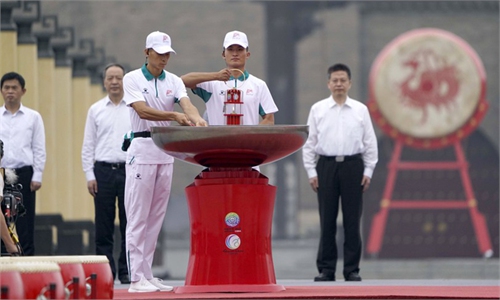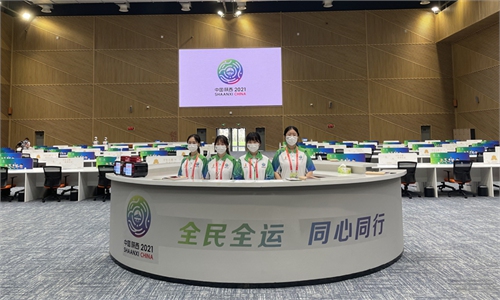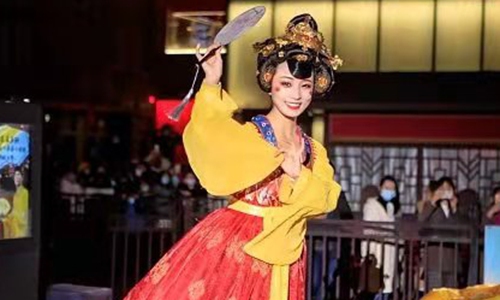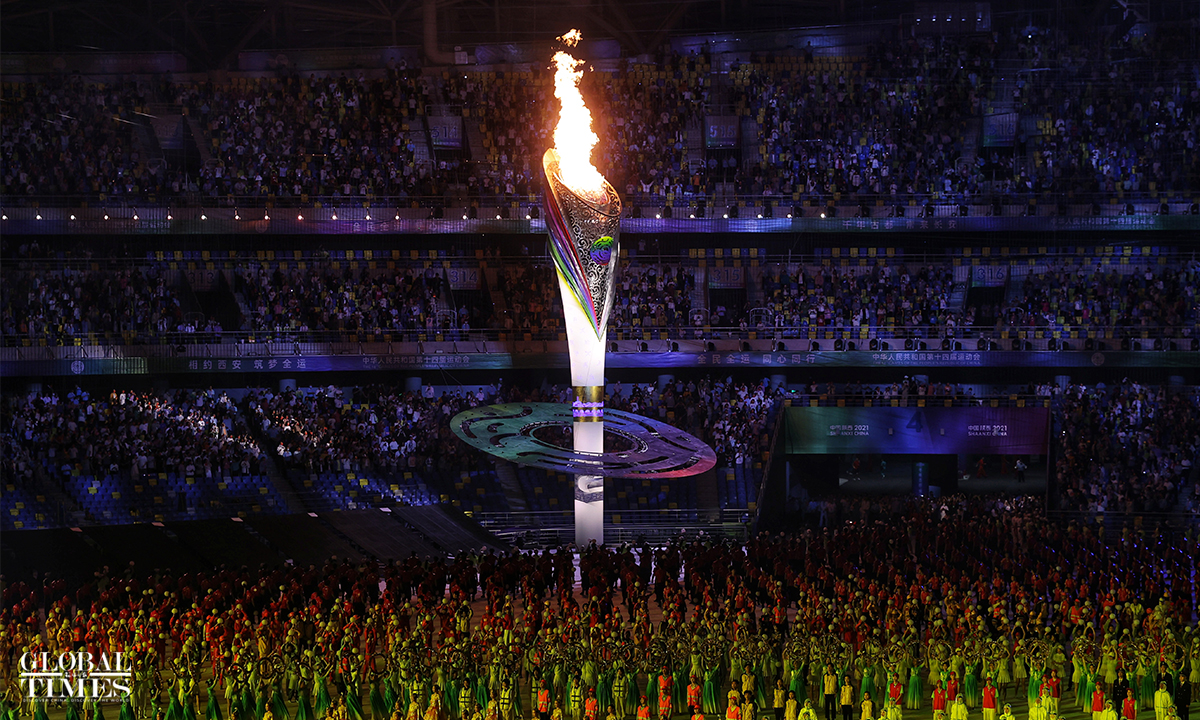
China’s 14th National Games kick off at Xi’an Olympic Sports Center on Wednesday evening. Photo: Cui Meng/GT
Different from the COVID-delayed Tokyo Summer Olympics, which held an opening in a near-empty stadium in July, China's "mini-Olympics," the 14th National Games of China officially started with a gala performance and colorful lightshow cheered on by spectators in a packed stadium in Xi'an, capital of northwest China's Shaanxi Province on Wednesday evening.
Many athletes and reporters who participated in the Tokyo 2020 Games nearly two months ago said that when they arrived at the National Games villages, their impression is that Xi'an is much better than Tokyo in terms of facilities, a feeling that carried through to the opening ceremony.
At 8 pm, the four mascots of the Games entered the stadium to welcome visitors from all parts of the nation. The Chinese National flag and the National Games flag were brought into the venue, followed by athletes who were greeted with cheers.
In addition to the host Shaanxi delegation, the Hong Kong and Macao delegations also received a huge cheer from the audience. Hong Kong and Macao, along with Guangdong Province, will co-host the 2025 edition of the National Games.
Chinese President Xi Jinping declared the country's premier multi-sport event open at Xi'an Olympic Sports Center on Wednesday evening. It is the first time the quadrennial event is held in western China since it started in 1959. This time, more than 12,000 athletes will participate in 595 events across 54 sports.
The event is an important pledge for "victory in the fight against the epidemic and success of the Beijing Winter Olympics," Liu Guozhong, the secretary of the Communist Party of China (CPC) Shaanxi Provincial Committee, said at the opening ceremony. "Chinese sports have witnessed the great leap of the Chinese nation from standing up, becoming rich, to becoming strong," he said.
After tens of thousands of volunteers finished their artistic performance, the opening ceremony reached a climax as China's first gold medalist at the Tokyo Olympics, shooter Yang Qian lit the cauldron. The torch was passed to Yang in a relay from top sprinter Su Bingtian, gold medal swimmer Zhang Yufei, Olympic diving winner Qin Kai, Olympic air pistol gold winner Guo Wenjun, and Ma Long, captain of the Chinese table tennis team and back-to-back Olympic gold medalist.
Before arriving at the 60,000-seat Xi'an Olympic Center Stadium, the torch had traveled for 28 days and 14 stops across the province relayed by 1,000 torch bearers.
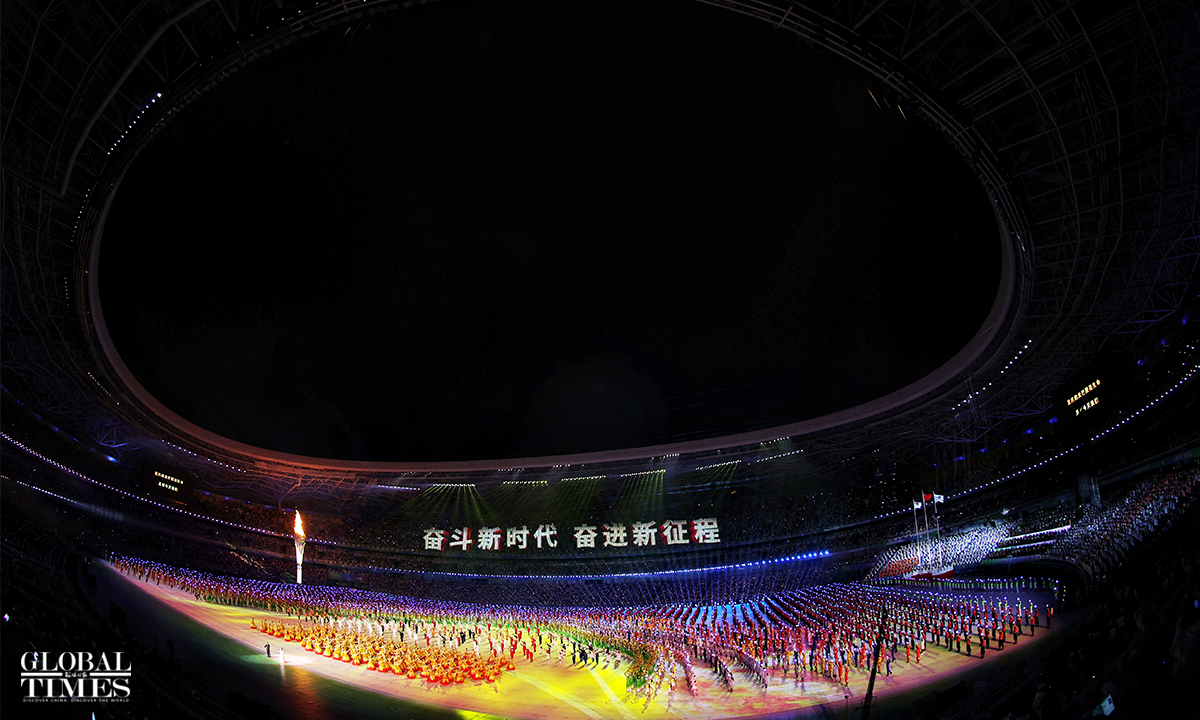
Photo: Cui Meng/GT
Compared with boycotts outside the Tokyo stadium with residents fearful the Games would spark a worsening epidemic, people in Shaanxi, especially Xi'an residents, displayed their excitement and hospitality, which come from responsibility, confidence, as well as development opportunities.
The host city rich in history makes no secret of its high goal: that zero-infection strategy for public health and allowing spectators inside sporting venues can co-exist well. The event is seen as an important test for next year's Beijing Winter Olympics.
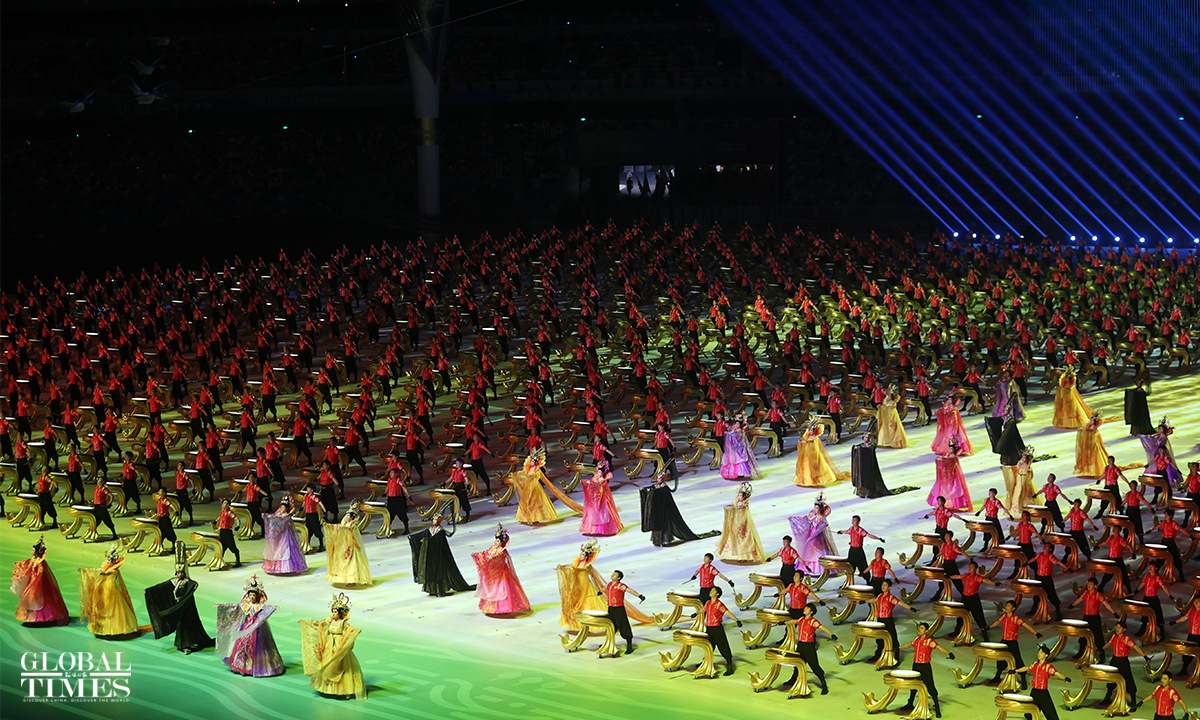
Photo: Cui Meng/GT
Cultural Extravaganza
Due to eco-concerns, there were no fireworks show, instead the sky was lit up with a spectacular light show, with tens of thousands of people singing in chorus.
The one-hour cultural extravaganza included more than 11,000 college student volunteers, who practiced for eight months with three full dress rehearsals.
The first segment of the show emphasized cultural confidence, with 2,021 young student drummers brandishing their drumsticks. It was followed by art performances featuring different dynasties. Tang Dynasty dancing performances took the audience back to one of the most prosperous periods in Chinese history. Xi'an was also capital city of the Tang Dynasty.
Xi'an served as the capital for 13 dynasties and kingdoms. As the starting point of the ancient Silk Road, Xi'an was the center of exchanges between East and West, and today is still a crucial stop for the Belt and Road Initiative.
The second chapter saw a red boat sail into the stadium, piercing the darkness, followed by red ribbons, symbolizing that 2021 marks the 100th anniversary of the founding of the CPC. Besides cherishing the hard-won peace, actors in old-time wartime uniforms reminded people that Yan'an in Shaanxi Province is the cradle of the Red Revolution.
In 1941, during the Yan'an period of the CPC, late Chinese leader Mao Zedong wrote an inscription for the sports special issue of the Liberation Daily: "Develop sports and improve the people's physique."
On August 8, China's annual National Fitness Day, the State Council released a new five-year plan, which aims to refine the public fitness system, with the goal of 38.5 percent of the population regularly taking part in physical exercise.
Observers said that China has demonstrated its ambition to build a leading sporting nation in many ways and has made progress in building its sports infrastructure and growing its sports population. And building a strong sporting nation will help China improve the quality of the population, which is another criteria of becoming a world power.
In the third chapter of the performance which embodies the theme "Chinese Dream," a group of dancers portrayed one of the creatures that lives in Shaanxi's Qinling Mountains - the crested ibis. Wearing pink and white costumes, the elegant performers flew through the air as they recreated the beautiful scenery of the crested ibis.
Forty years ago, the bird was thought to be extinct, but seven were discovered in Yangxian county, Shaanxi Province. Today, due to careful conservation, there are more than 7,000 crested ibises. This program is a miniature of China's achievements in ecological civilization construction.
Later, a dynamic dancing performance showcased Shaanxi-related scientific and technological achievements, including the BeiDou satellite positioning system and the space sector, with the Chang'e lunar exploration missions.
At the end of the show, doctors, nurses, police offers and workers - people who represent all walks of life - gathered around a huge Chinese national flag in the middle of the field.
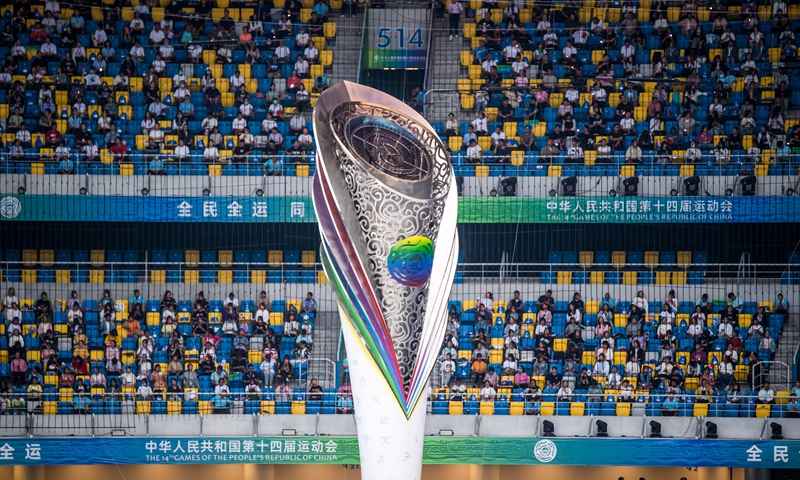
Photo: IC
Mask off, mask on
More than 46,000 people who were involved in the opening ceremony wore masks during the event on Wednesday, including athletes, performers, audiences, technicians, security guards, other staffers and officials.
But Global Times reporter has learned that the organizers had previously considered not wearing masks at the opening ceremony, but gave up the plan because the ongoing outbreak in Fujian has raised the alarm, and only keeping the zero-infection till the closure of the event, it then truly completes its multiple goals, such as testing China's prevention and control strategies and building up experience for the Winter Olympics in Beijing in three and a half months.
A current localized outbreak in East China's Fujian Province is still seeing cases grow, although at present it is of "limited impact," Beijing on Wednesday reported five suspected cases.
Under the principle of "dynamic zero infection," the flexible, timely but also prudent measures by the organizers showcases China's capacity and confidence in epidemic control at grand sports events, analysts said.
Xi'an Health Commission said that since August 4, over 13.6 million Xi'an residents had been tested for COVID-19, with all tests negative. By September 2, Xi'an had administrated over 22.4 million COVID-19 vaccine doses, with the coverage rate of second doses reaching 94.14 percent to eligible populations.
Aside from the closed-loop management of reporters and athletes, a student volunteer surnamed Chen told the Global Times there are strict procedures in place.
"We signed up in October last year... The unified management and training at the Xi'an Hotel, which we checked in on August 31 this year, follows the closed-loop principle and site-to-site transportation," Chen said.
Given the low commercial and ticket returns of the previous National Games, Global Times learned that tickets for the opening gala were distributed by the organizing committee given it is in the special epidemic period. The spectators included students, sponsors and government employees.
"Before the opening ceremony, I had to quarantine for 14 days at a designated hotel, had a nucleic acid test every three days, and I had to present a negative nucleic acid test within 48 hours before the opening," one spectator told the Global Times.
"This is not only for my own safety, but also for the safety and health of everyone," the spectator said.
At a time when the world is still overshadowed by the pandemic, that China is able to hold as scheduled its major national games with tens of thousands of participants and spectators certainly sends a positive signal to the nation and the world, Zhao Jisheng, a professor with the College of Physical Education and Sports at Beijing Normal University, told the Global Times.
The event shows the world China's proven mechanisms and achievements in epidemic prevention, boosts the confidence of the Chinese people, and is a warm-up for the upcoming 2022 Beijing Winter Olympics, Zhao said.
A source connected with the Olympics who requested anonymity told the Global Times that the essentials of epidemic prevention for the Beijing Winter Olympics is basically confirmed, and it will be stricter than in Xi'an, as if there is an outbreak caused by foreigners coming in, it will be unbearable for Chinese capital which is larger and more densely populated than Xi'an.
During the Beijing Winter Olympics, it is estimated that the number of foreign arrivals will be less than 30,000, media reported.
The closed-loop management that began in Tokyo, after Xi'an, will continue in Beijing, the source said. He explained that through the "airport-Olympic Village" management, foreign athletes will enter the bubble without contact with the outside world. And their departure will follow the same principle. If they intend to stay in China, they will follow the regulations of Chinese athletes with a 21-day quarantine and negative nucleic acid test result before leaving the bubble.
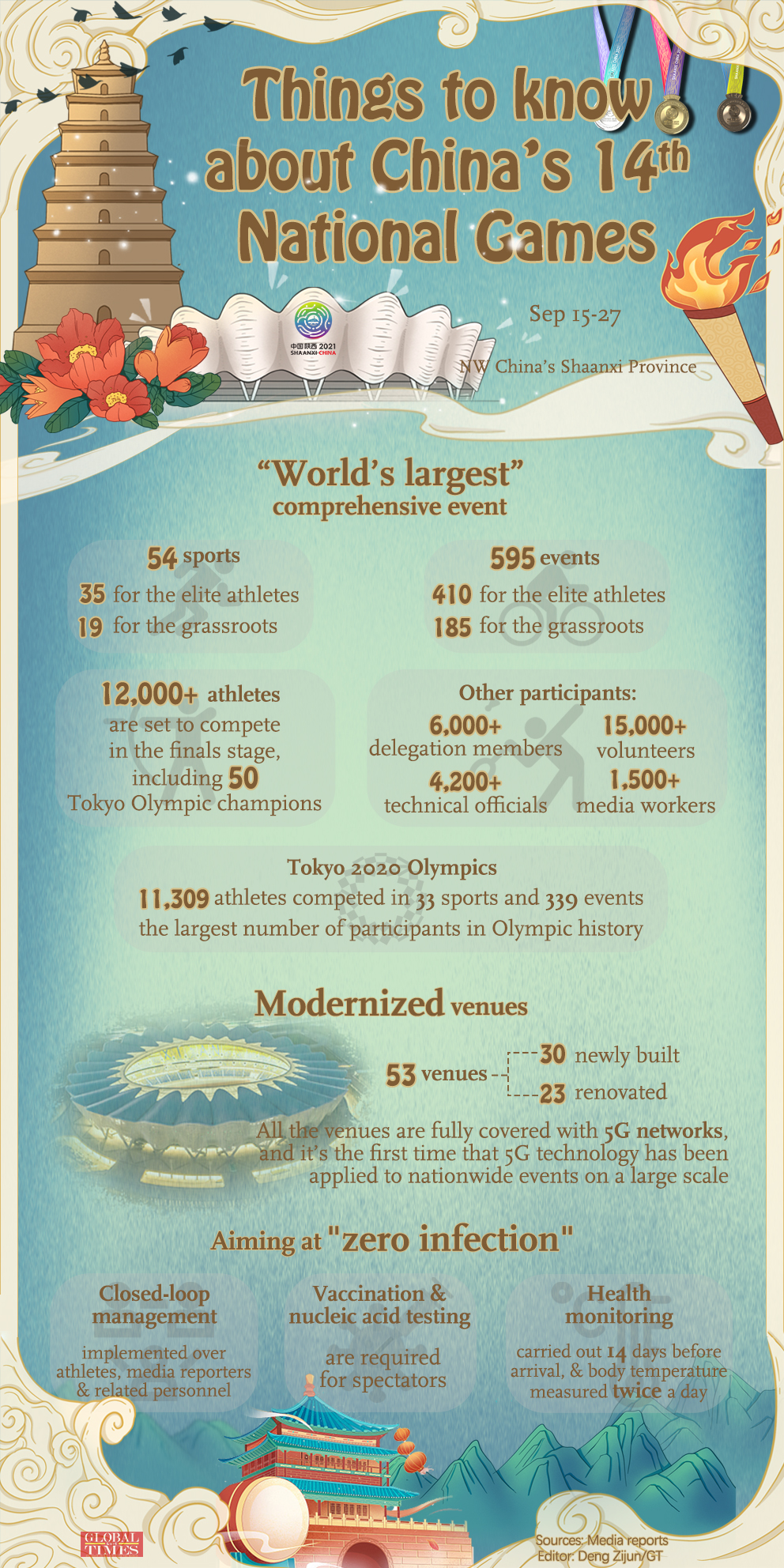
Things to know about China's 14th National Games. Graphic: Deng Zijun/GT

